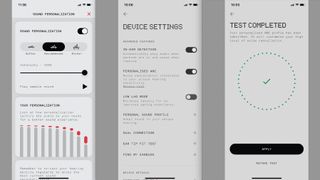I was wrong about Nothing: I tried Ear (2)’s personalized hearing tests – they’re a big hit
It’s another first for Nothing! OK, despite the Nothing Ear (2) arriving as a second-gen. product, it’s the first time Nothing has ever released such a thing, so… yes.
You’ve seen the leaks, but now I have a set… so read the truth. It’s good news.
“What about the Nothing Ear Stick?” I hear you cry! Well, those were an entry-level set of buds that came without noise cancellation – and I may have been harsh on the sound quality. And let’s be honest, despite their popularity, Nothing Ear (1) never quite lived up to the hype for sound and connectivity either.
But that’s all about to change. I need to tell you that this is the Ear (1) update I’ve been waiting for. These buds are the kind of thing only a firm that truly cares about sound quality could unveil: hi-res certified earbuds (up to 24 bit/192 kHz can be transmitted at speeds reaching 1Mbps. And they’re compatible with LHDC 5.0 codec technology) but with flair.
Will they saunter happily into our best noise-canceling earbuds buying guide? It’s not a glowing start initially, but this soon melts away.
Put the original Nothing Ear (1) next to the Nothing Ear (2) and you’d be forgiven for thinking very little has changed. The edges of the new case are slightly sharper and the back is sort of, bobblier (as if hugging the earbuds) and the fidget spinner remains – long may it live – but so far, so similar. In the image above, the Ear (2) is on the left.
Nothing also tells us that the Ear (2)’s three mics have been repositioned to provide even better noise resistance, and an AI noise-reduction algorithm will work together to make calls feel like face-to-face conversations – come back to me for a full review on that soon.
Nothing’s 11.6mm driver has now been given a polyurethane-and-graphene diaphragm, plus a “new unique dual chamber design”. But the biggest changes implemented this time around involve software under the hood. And this is where they start to reveal their new talents. I know, I’ve been having a play with them…
Opinion: a practically perfect personalized sound profile
Nothing, you’ve really done something for the money here, you know that right?
There’s the initial ear tip test – takes a few seconds; job done. But then, there’s the option to create a personal sound profile and here, things get very interesting – and all handled by Nothing’s new slick, comprehensive, and multi-faceted Nothing X app.
You need around five minutes in a quiet environment. And you need to be honest when Nothing’s software asks you whether you can still hear beeps in among the background noise as the test progresses. Each ear will be tested. And even when the test is complete, you have the option of an intensity slider (in 1% increments) plus Nothing’s ‘softer’, ‘recommended’, or ‘richer’ presets.
When the test is complete, you’ll see a graph where red indicates Nothing’s sonic augmentation – but if you go into the EQ tab you can see this as a blob too, under the ‘custom’ tab. This is the way audio-focused competitors typically like to depict such profiles – most notably Nura, with its NuraTrue Pro. Only, those earbuds cost $329 / £299 / AU$499…
I tried the test. Twice. And I certainly felt an extra ounce of detail through the treble; an extra tinkling in the wind chimes at the outset of The Cure’s Plainsong before the expansive bass and synths drop. During Tom Grennan’s Sweet Hallelujah I heard texture in the singer’s emotive vocal I’d not heard in a Nothing product to date.
And I’m not done! It takes far less time, but on top of Noise Cancellation (high, mid, low, or adaptive) and Transparency or Off options, you can take an ANC test! All you have to do is sit quietly in the noisy environment you find yourself in (the mics really do need something to work with) and in a matter of moments your personalized ANC profile will be with you.
In my limited time with them so far, I’m impressed. Conversations near my desk have been all but eradicated using my personalized profile.
All this, plus IP54 water-resistance rating for the buds (IP55 for the case) a battery-life claim of 36 hours including the case (with ANC off), and charging them for 10 minutes will get you up to eight hours of playtime.
How much? $149 / £129 / AU$219 and launching today. And for this price, I cannot imagine they won’t feature in our best wireless earbuds guide imminently. But again, check back for a full review…

